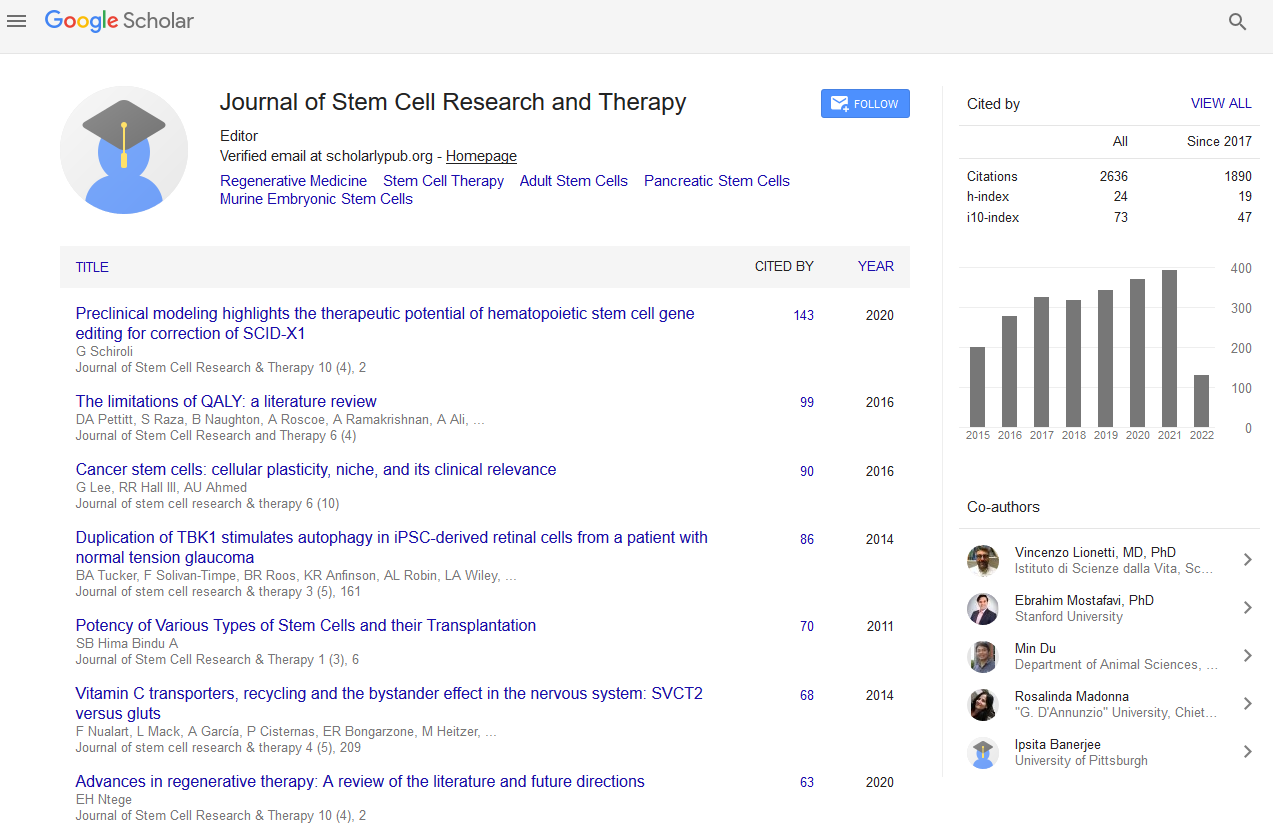Indexed In
- Open J Gate
- Genamics JournalSeek
- Academic Keys
- JournalTOCs
- China National Knowledge Infrastructure (CNKI)
- Ulrich's Periodicals Directory
- RefSeek
- Hamdard University
- EBSCO A-Z
- Directory of Abstract Indexing for Journals
- OCLC- WorldCat
- Publons
- Geneva Foundation for Medical Education and Research
- Euro Pub
- Google Scholar
Useful Links
Share This Page
Journal Flyer

Open Access Journals
- Agri and Aquaculture
- Biochemistry
- Bioinformatics & Systems Biology
- Business & Management
- Chemistry
- Clinical Sciences
- Engineering
- Food & Nutrition
- General Science
- Genetics & Molecular Biology
- Immunology & Microbiology
- Medical Sciences
- Neuroscience & Psychology
- Nursing & Health Care
- Pharmaceutical Sciences
Abstract
The Role of Immunosuppression in the Transplantation of Allogenic Neural Precursors Derived from Human Pluripotent Stem Cells for Parkinson ’ s Disease
Casimir de Rham, Vannary Tieng, Benjamin B Tournier, Yannick Avila, Nathalie Ginovart, Karl-Heinz Krause, Olivier Preynat-Seauve, Michel Dubois-Dauphin and Jean Villard
Objective: Neural progenitor cells (NPC) derived from human embryonic stem cells have the potential to differentiate into mature neurons after transplantation in the brain, opening the possibility of regenerative cell therapy for neurodegenerative disorders like Parkinson’s disease. For such therapy, the source of NPC is genetically unrelated to the patient, leading to potential rejection of the transplanted cells by the host’s immune response. Rejection can be prevented by the use of immunosuppressive drugs (ISD). Previous works have suggested that cyclosporine and dexamethasone used in classical immunosuppressive regimen could prevent the terminal differentiation of NPC into mature neurons depending on culture conditions. Methods: We have investigated in vitro the role of other ISD, Intra venous Immunoglobulins (IvIG), mycophenolate mofetil and tacrolimus. We have tested the immunosuppressive activity of tacrolimus and cyclosporine on the effector of natural killer (NK) and CD8+T-cells and performed a microarray to analyse the difference between the two drugs for the neuron differentiation. Finally, human transplanted neuroprecursor cell survival has been analyzed in rats treated with tacrolimus or cyclosporine and anti-inflammatory treatments. Results: IvIG and mycophenolate mofetil interfere with the development of NPC into mature neurons, but tacrolimus do not inhibit the maturation process of NPC. Microarray experiments demonstrate significant differences between cyclosporine and tacrolimus gene expression during NPC maturation into mature neurons. Tacrolimus like cyclosporine is able to inhibit the CD8+T-cells activation against neural progenitors, but both are unable to block NK cells activity. NK cells could be potential harmful weapons to reject NPC and mature neurons. In rats treated with both immunosuppressive (tacrolimus or cyclosporine) and anti-inflammatory treatments, engrafted human neuroprecursors cell survival is good and the microglial density is low. Conclusion: These data suggest in vivo that both tacrolimus and cyclosporine, with an


